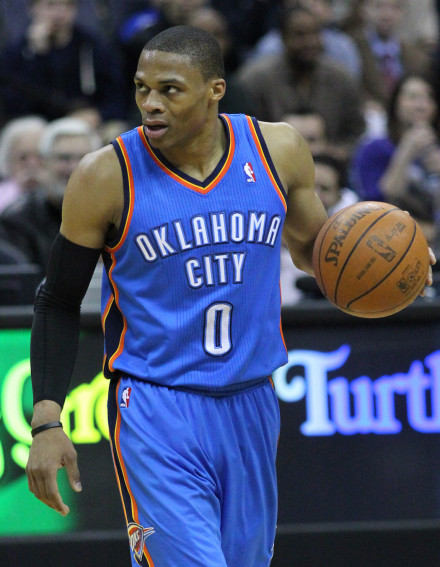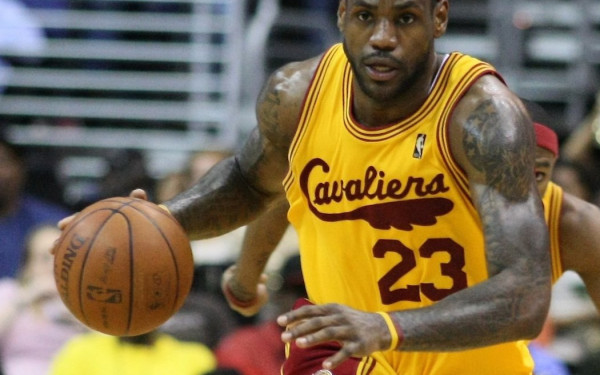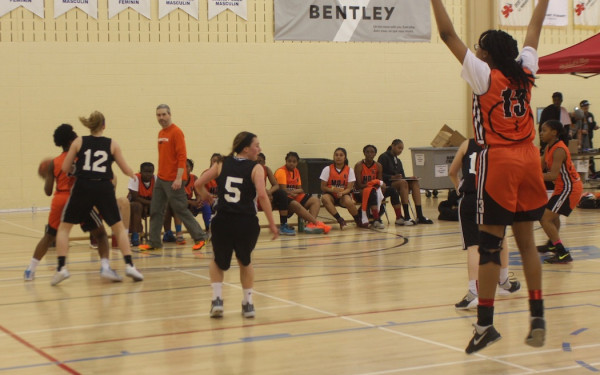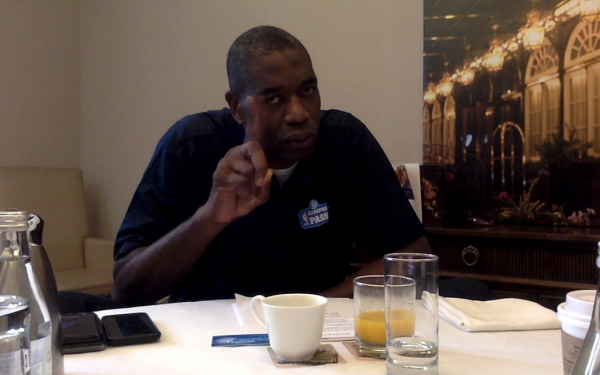Give Westbrook The MVP Or I’m Going Streaking
For the past decade, pundits and fans alike have repeated the same catchphrase: “If it were really about basketball, LeBron James would be the MVP every year.”
The truth is that the NBA’s most valuable player honours are awarded for more than basketball.
To be the real MVP requires outstanding individual statistics above all else. That has never been disputed. However, recent trends have shown that the voters have taken a formulaic approach to determining the eventual winner. They look beyond the traditional constraints of the game, and consider the impact each candidate’s season had on the grander context of the NBA.
This year’s MVP race is going down to the wire.
It is perhaps the most polarizing race I have ever seen. The pool of candidates has been narrowed down to Houston Rockets’ shooting guard James Harden and Oklahoma City Thunder point guard Russell Westbrook. Harden has had an incredible and historic season from a statistical standpoint. The caveat? He played on a better team than Westbrook did. Any other year, he’d be the unanimous pick for the award.
Not this year.
I’m going to tell you why:
1. Stats
By now, you’ve probably heard plenty about Russell Westbrook’s monumental statistical achievements this season. He broke Oscar Robertson’s 55-year old record of 41 triple-doubles. The shot he took to clinch that triple-double? Oh, just a 35-foot clutch game-winning shot.
If that wasn’t enough for you, Russ cleared another historic landmark by averaging a triple-double for the season. He averaged 31.6 points per game, 10.7 rebounds and 10.4 assists—he is the second player in NBA history to achieve this milestone, Oscar Robertson also being the first.
James Harden nearly averaged a triple-double this season, as well. He averaged 29 points, eight rebounds and 11 assists. His role in the Houston Rockets’ offence was different, though.
While he often did act as the team’s primary ball handler, he wasn’t. He had far more freedom to be creative and focus on scoring as many points as he could. Westbrook was the Thunder’s primary ball handler, meaning his main responsibility was making sure that his teammates scored points, as well as him. For Westbrook, scoring is just part of what he’s supposed to do. Harden is pretty much only there to get buckets.
Obviously, Westbrook was successful in doing so. He averaged more points per game than Harden did, while also being a very effective distributor of the ball, evidenced by his 10 assists per game.
Advantage: Russell Westbrook.
2. Championships Don’t Matter, But Winning Does
Derrick Rose, LeBron James, LeBron James, Kevin Durant, Steph Curry, Steph Curry. Those are your last six MVP’s. Of those six, only half played on the team that eventually won the NBA Championship. James’ two MVP nods came during his two championship campaigns with the Miami Heat. Curry was given the award in Golden State’s 2014-15 title year. Rose and the 2010-11 Chicago Bulls only made it to the Eastern Conference Finals, while Kevin Durant’s 2013-14 Oklahoma City Thunder lost to the San Antonio Spurs in the Western Conference Finals without much resistance. What does this all mean? Championships certainly won’t hurt your MVP chances, but they won’t determine them, either.
When Kevin Durant, widely regarded as the NBA’s second best player after LeBron James, left Oklahoma City last summer to sign with the Golden State Warriors in hopes of winning a championship, the Thunder immediately regressed from a title contending team, to an afterthought. Sure, they still had Russell Westbrook, but he was never going to be enough to survive the brutal Western Conference and get them to the playoffs.
This isn’t a “the grass isn’t always greener” scenario either—Oklahoma City probably wasn’t a sure bet to win a championship even with Durant. The Warriors, conversely, were already expected to win it all without Durant. If a championship is truly what Durant seeks, he absolutely made the right choice.
Without Durant, the Thunder were a team of average to below-average players and one perennial all-star in Westbrook. Against all odds, Westbrook led his team to the sixth (out of eight) seed in the Western Conference playoffs. They won 47 games in the regular season, including several against teams much better than them.
According to the NBA’s “Real Plus-Minus” statistic, a stat that measures how many more games a team would win if they were to replace a specific player with a statistically average one, Westbrook was nearly 17 wins above replacement-level. Without him, Oklahoma City would have a projected win-loss record of 30-52, good for the the sixth worst mark in the NBA this season.
Instead, they’re in the playoffs. They won’t win a championship. Hell nah. But they’re there, and it’s entirely thanks to Russell.
Winning: check.
3. Usefulness
If you’ve ever heard me talk about basketball, you’ve probably heard me say that basketball players shouldn’t be judged by their talent, but by their usefulness. What I mean by this is a talented player who doesn’t fulfil a task on a team is of less value than a bad player who does perform a task—whether that might be a big or a small one.
James Harden and Russell Westbrook are obviously very, very useful players. They’re the most important members of their respective teams, and are the primary reason why each team had good seasons.
I think that it’s pretty clear that Russell Westbrook is a lot more useful, though.
Going off of a traditional analysis of “use” in basketball, the advantage already favours Westbrook. The “usage-rate” statistic calculates the percentage of a team’s possessions used by a specific player. In other words, it is the percentage of all offensive possessions ending with a shot attempt, a turnover or a free-throw by a one player. This season, Westbrook’s usage rate was 41.7 per cent. Harden’s, 34.2 per cent. Given the fact that Westbrook had a better statistical season than Harden did, we can then say that Westbrook was the more useful player.
Westbrook, as previously mentioned, was responsible for making passes and facilitating the Thunder offence while Harden was more free to score and focus on playing offence. Westbrook still managed to have the better season on the offensive end, and he did it on a worse team.
Whether you think use translates to value is subjective. There are useful players in the NBA that are entirely replaceable. Westbrook and Harden are not replaceable players. But this year, Westbrook did more and had more responsibilities. He had be the team’s focal point—the rest of his team wasn’t going to provide the kind of help that the rest of Harden’s team would.
Additionally, James Harden’s famously poor defence continued to be laughably bad this year. His defensive rebound percentage was 20 per cent compared to Westbrook’s 28.8 per cent. Westbrook’s steal percentage was higher, 2.3 per cent to Harden’s 2 per cent. His defensive plus-minus—a statistic identical to “real plus-minus” but exclusively for defence—is at 4.7 per cent compared to Harden’s 1.5 per cent.
Westbrook’s defensive season is even more impressive when you consider the number of minutes both players play in a game. It is vital that both players don’t become a defensive liability. Otherwise, they’d be easy targets for the opposing team to pick on. They’d be aware that they wouldn’t offer up much resistance and would use that to their advantage since both players are almost always on the floor.
Westbrook never became a defensive liability, Harden was never anything but one. Also worth noting: Harden is taller and has a body more suited for good defence.
Westbrook was more useful on both ends of the floor, making him a more valuable player to his team.
Usefulness: advantage Westbrook.
4. A Memorable Season
In the NBA, an MVP season can’t just be good. An MVP season has to be memorable. When Derrick Rose won in 2010-11, people voted for him because he came out of nowhere and propelled the Chicago Bulls to a 60-win season that featured dramatic victories over teams that were probably better than his. He also became just the third player in NBA history to record a 2000 point, 600 assist season. He did all of this at 22 years old, and the voters were not afraid to make a splash by naming him the youngest MVP in league history.
Russell’s season started on July 4 when Kevin Durant signed with the Golden State Warriors. Westbrook did not take well to the news. He was probably right, too. Durant does have a better chance at a title with the loaded Warriors, but the Thunder were one win away from beating the Warriors and advancing to the NBA Finals in 2016. Durant wasn’t going from a hopeless team to a contender; he was simply going from a contender to a contender-er.
The move was as polarizing as this MVP race.
One side called Durant a sell out for his decision, upset that he was leaving a team that he had helped build into a contender to join a rival team that had built their own identity. The other side congratulated him for making the unpopular decision and for giving himself the best chance at winning a championship
Westbrook was not happy about the news. He wasn’t happy at all.
The newfound feud between the two old friends was played out in a series of very public displays of hatred. The two were seen ignoring each other at the Summer Olympic games in Rio. Whenever either one was asked about their relationship with the other, they’d offer no comment.
My favourite moment of the entire feud had to be Westbrook shooting a commercial for the Jordan Brand, which he endorses, in which he dances to Lil Uzi Vert’s “Do What I Want.” Because now, Westbrook was going to do whatever he wanted. The message was easily interpreted. He was going to be a lone ranger on a mission; getting revenge on Kevin Durant, and showing the world that he was capable of winning without him.
He never got that revenge, though. The Thunder lost all three of their meetings with the Warriors this season, and are currently losing their first round playoff series to James Harden’s Houston Rockets which will deny him the opportunity of facing Durant and the Warriors in the playoffs.
Still, Westbrook did what he wanted this year and did it in style. Kevin Durant didn’t have to have an unbelievable statistical year because he plays on a team that features the likes of Steph Curry, Klay Thompson and Draymond Green—a trio of MVP candidates in their own right. Westbrook did, because his team isn’t good, and they were not expected to even make the playoffs.
If nothing else, Westbrook showed that he can indeed succeed without Durant, and he can do it by almost single-handedly carrying a team. That confluence of events, combined with his statistical achievements, are pretty unforgettable.
James Harden’s season was historic for basketball reasons but not for anything else. Voters have shown and will continue to show a tendency to side with a player who had a flashy season.
Westbrook easily checks off this box, too.
***
There’s the formula.
Win games, play well, be irreplaceable and do it in in style.
The two sides in the Harden-Westbrook debate are at odds over how well each candidate played offence. Harden has an unappealing, but incredibly effective style of offence based on getting fouled, taking free throws, and shooting a lot of three-pointers. He makes those shots and it helped the Rockets record one of the best offensive seasons in NBA history.
Essentially, Harden is the candidate for people who tend to favour “smart” and highly technical basketball. He’s the candidate for people who love analytics and who are enamoured with the art of the game.
Westbrook’s game is spectacular, and his season was historic. He did well defensively, and played some of the best offence anyone has ever seen. He’s the candidate for those who like entertaining basketball.
Their seasons will go down in the record books. Westbrook’s season is worthy of entering the history books.
If Russell Westbrook does not win this year’s NBA MVP award, I will run down Crescent Street on a broadly-lit Friday afternoon, barefoot, wearing nothing but boxers and a t-shirt and will broadcast it over Facebook Live.
The ball is in your court, voters.




_600_375_90_s_c1.jpg)


